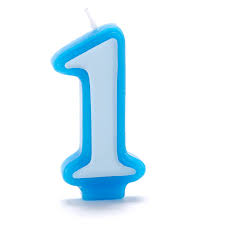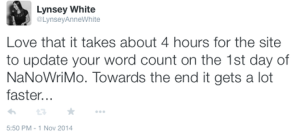Happy thirteenth day of NaNo! It’s the day your novel gets its tongue pierced and tells you to go feck yourself.
At least it’s not a Friday, right?
Is your nano-novel having a teenaged tantrum? I left mine alone yesterday, entirely without supervision. Heading back there now to check it hasn’t trashed the house in my absence…
5 minutes later
Fixtures and fittings still in place. An empty bottle of vodka inside the toilet cistern and some fag butts under the bathroom window, but otherwise all seems much as I left it.
An hour later
Hmm. Well, this is a bit annoying. Until today, I had all of my nano words in a single Scrivener file (easier to tot up the word-count that way, as I reasoned) but every five thousand words or so there were strange blank spaces appearing (as if the words had been struck-through, but the strike-through itself was invisible, if that’s not too horribly complicated an image to fathom). Hence, a decision was made! Create a new project, solely for nano, split everything in that way too long document into separate scenes, give the scenes little titles, and see where we are. (It turns out it’s the work of, oh, about six seconds, to click: Project; Statistics and tot up the total.)
Where we are, people, is 410 words down on what I thought my word-count was. I’ve heard mutterings, on the internet, about Scrivener word counts not being entirely reliable, and I’m as confident as a jelly-head like me can be that I haven’t accidentally deleted something. So I’ll have to push on, writing 410 extra words on top of the double quota I already had to do today, anyway, because yesterday didn’t happen, blah blah, world’s smallest violin, etc. 410 words is a small price, though, because two important things have happened:
- I’ve been reminded of things I’d forgotten I’d written (continuity errors ahoy!)
- I’ve gained a bird’s eye view of proceedings (insert proverb here about ‘wood’ and ‘trees’ and not being able to see one for the other).
I know I’ve gone on about Scrivener before (here), but I really, honestly, do recommend it for those of you writing novels. If you do what I’ve done, and name every scene, you’ll be able to look at the spine of your story, so far, while you’re writing, in that left-hand column there (see above). I much prefer finding the spine in a book that has flesh on already, instead of the more traditional way: spine first, flesh later. Which isn’t to say I’m a ‘pantser’ (a person for whom plotting is anathema). It’s just that plotting ‘cold’ doesn’t work for me: I need to plan a bit, write a bit, plan a bit, write a bit. Realise my original plan was bullshit and start all over again. It takes longer that way (unsurprisingly). But, for me, it’s more truthful. I can’t get on board with a scene – no matter how ‘vital’ to my plot – if that scene doesn’t yank my chain somehow. And there’s simply no way to know what will yank your chain, when you actually sit down to write it, and what will leave you colder than David Cameron in his underpants than to… well, to actually sit down and write it.
I don’t think I’m that great at the nuts and bolts of plot, but I do know when it isn’t working (I’m in good company, here: Stanley Kubrick – one of my top five directors – often knew what he didn’t want, more than what he did want). I make up for it, I hope, by being pretty good on theme and unity. I try to convince myself, quite often, that what I’ve got is okay, serviceable, perfectly good – but there’ll always be a niggle, until I’ve condensed all the disparate elements down to their absolute minimum. As I wrote about here, you don’t want any extra baggage.
Trust your instincts. If something feels wrong, it probably is.





















